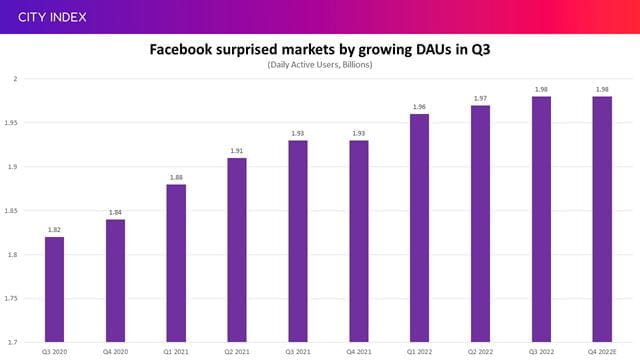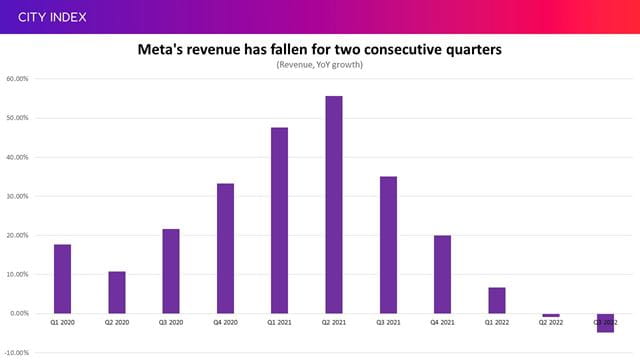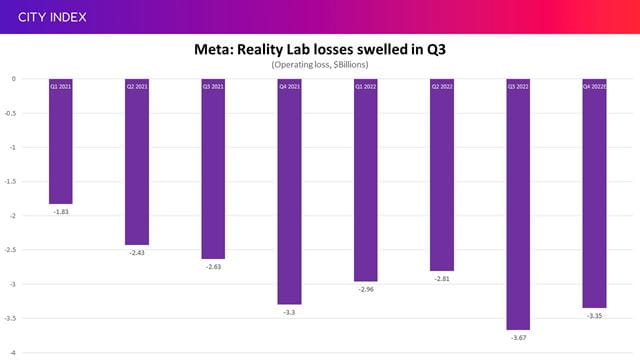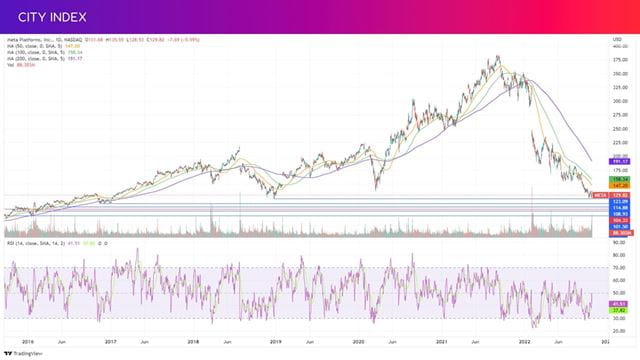
Meta stock down 20% before the bell
Meta shares are down almost 20% in extended hours trade today and at their lowest level since February 2016 after earnings missed expectations in the latest quarter and the company warned that they will could remain under pressure from rising costs into 2023.
That puts the stock on course to suffer its sharpest fall in a single day since February 3, when markets punished the stock after it revealed Facebook lost users for the first time in history and issued a disappointing outlook.
Facebook posts surprise increase in users
Meta delivered a surprise when it came to Facebook’s user numbers. Wall Street had forecast that Facebook’s Daily Active Users (DAUs) would fall 5.5% to 1.86 billion in the third quarter from the 1.97 billion it had in the second. However, DAUs experienced a mild increase to 1.98 billion in the period.
The growth has also prompted analysts to upgrade their expectations. Wall Street believed Facebook DAUs would hit 1.87 billion in the fourth quarter but the beat in the third has seen this lifted to 1.98 billion.
That will help Meta fend off accusations that Facebook has already reached its peak, but tepid user growth was not enough to impress the markets given its financial results.

(Source: Q4 estimates from Bloomberg)
Meta: Topline beat but earnings disappoint
Meta reported a 4% decline in revenue in the third quarter to $27.7 billion, which came in just ahead of the $27.4 billion forecast by Wall Street. However, that was the second consecutive quarter of lower revenue, which is suffering from a myriad of headwinds, including a 18% year-on-year drop in pricing.

That was far sharper than the 5% drop in pricing reported by juggernaut Alphabet earlier this week, showing that social media stocks are having a much tougher time amid softer demand for advertising.
Read more: Alphabet stock plunges as advertising slowdown bites
That is because the industry is grappling with its own problems. For Meta, it is facing increased competition with the likes of TikTok, a shift toward less lucrative shorter-form videos and the IDFA changes introduced by Apple that has made it harder for social media stocks to target their ads at users and has ultimately made their services less effective.
Notably, the strong dollar was a major headwind the quarter. In fact, if foreign exchange rates had stayed the same as last year, then revenue would have been up 2% in the quarter.
More concerning was the fact that EPS plunged by 49% to $1.64 in the quarter and fell far short of the $1.88 pencilled-in by analysts. That marked the fourth consecutive quarter of lower earnings as costs continue to soar, having jumped over 19% in the latest quarter and causing its operating margin to plunge to just 20% from 36% last year. Earnings were further dragged down by over $400 million of impairments as it rationalises its office space, as well as almost $3.7 billion of losses from its Reality Labs unit that homes its metaverse investments.
Meta earnings to remain under pressure until 2024
Meta said it is targeting revenue of $30.0 billion to $32.5 billion in the fourth quarter of 2022, which was better than the $27.4 billion expected by Wall Street.
However, that rosier near-term sales outlook was overshadowed by bleaker prospects for earnings over the next year.
Meta said it now expects total costs in 2022 to be in the range of $85 billion to $87 billion, which has been tightened from its previous target range of $85 billion to $88 billion. That will still be around 24% higher than what we saw in 2021.
Rising costs will remain a headwind as we move into 2023 too, with Meta warning total expenses will increase to a range of $96 billion to $101 billion.
Meta said it is sharpening its focus on costs by keeping the headcount in some teams flat and downsizing others, with units pursuing its ‘highest priorities’ the only ones set to receive additional human resource. The overall result is expected to be that Meta’s headcount at the end of 2023 should be roughly level with the 87,314 members of staff on its books at the end of September.
‘We have increased scrutiny on all areas of operating expenses. However, these moves follow a substantial investment cycle so they will take time to play out in terms of our overall expense trajectory. Some steps, like the ongoing rationalization of our office footprint, will lead to incremental costs in the near term. This should set us up well for future years, when we expect to return to higher rates of revenue growth,’ said chief financial officer David Wehner.
It also warned that capital expenditure will also continue to increase in 2023 to a range of $34 billion to $39 billion, up from the $32 billion to $33 billion budget set for 2022. It said investments in artificial intelligence will drive ‘substantially all’ the increase in capex next year.
Meta still spending billions on the metaverse
One of the biggest drags on the bottom-line at present is the company’s costly metaverse ambitions. The Reality Labs division, which homes its metaverse ventures, posted its biggest quarterly operating loss to date in the third quarter of $3.7 billion.
Based on estimates for the fourth quarter, Meta is on course to have sunk a staggering $23 billion into the metaverse between the start of 2021 and the end of 2022 alone:

(Source: Q4 estimates from Bloomberg)
Meta is spending billions on the metaverse despite the fact it doesn’t expect to see any return for years to come and that its social media and advertising business is struggling. That has heightened pressure for Meta to pullback on its metaverse ambitions and steer more resources to reviving its core business, but, if anything, Meta doubled-down on its plans and warned that operating losses from Reality Labs will ‘grow significantly’ in 2023 compared to the $12.6 billion loss forecast for 2022. Currently, Wall Street believes the division could report a loss of over $15 billion in 2023.
Ultimately, this could prove the difference between Meta’s profits declining or growing in 2023 and will test the patience of investors.
‘Beyond 2023, we expect to pace Reality Labs investments such that we can achieve our goal of growing overall company operating income in the long run,’ Meta said, suggesting that profits will remain under pressure over the next 12 months and won’t start to recover again until 2024.
CEO Mark Zuckerberg said he appreciated that investors have been patient so far, adding he thinks ‘those who are patient and invest with use will end up being rewarded’.
Where next for Meta stock?
Meta shares are down 20% in premarket trade this morning at $104.30 (marked by the red line). The stock is set to open at its lowest level since February 2016. It also means Meta has now lost over 72% in value since peaking in August 2021.
We could see some the stock fall toward $101.50, marking the floor seen in the fourth quarter of 2015, before finding some support. Any further pressure could sink the stock to as low as $92.50, the level of resistance seen in July and August 2015 and marking the 2016-low. Trading volumes over the last five days have risen 74% from the 100-day average volume at time, suggesting there is plenty of momentum behind the fall.
The stock now has major ground to make up if it wants to return to where it closed yesterday. The first target is the $109 floor that held throughout the second quarter of 2016. The second is the floor that held firm later that year at $115. From there, the 2018-low of $123 will come back into view.

Meta currently boasts an average target price of $187, but this is likely to decline as brokers adjust their view following the latest update. A number of them have already cut their target price on Meta this morning, including Baird to $150 from $230, Piper Sandler to $116 from $175 and Jefferies to $155 from $200.
Take advantage of extended hours trading
Meta released earnings after US markets closed yesterday and this means most must wait until they reopen today before being able to trade. But by then, the news has already been digested and the instant reaction in share price has happened in after-hours trading. To react immediately, traders should take their positions in pre-and post-market sessions.
With this in mind, you can take advantage of our service that allows you to trade Big Tech stocks using our extended hours offering.
While trading before and after hours creates opportunities for traders, it also creates risk, particularly due to the lower liquidity levels. Find out more about Extended Hours Trading.
How to trade meta stock
You can trade Meta shares with City Index in just four easy steps:
- Open a City Index account, or log-in if you’re already a customer.
- Search for ‘Meta’ in our award-winning platform
- Choose your position and size, and your stop and limit levels
- Place the trade
Or you can try out your trading strategy risk-free by signing up for our Demo Trading Account.





